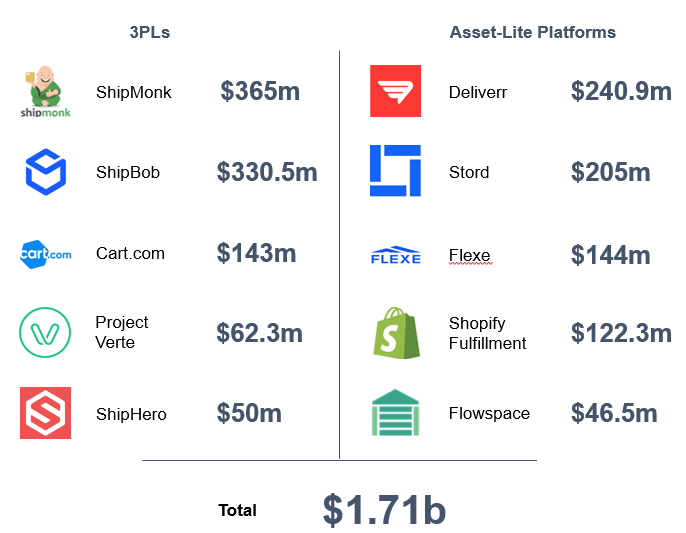October 1, 2021
The rapid growth of the eCommerce sector has generated demand for more flexible shipping options, especially for small and medium businesses. Fulfillment providers have filled this niche by offering affordable warehousing and delivery services for online retailers. Investors have poured billions of US dollars into these Direct to Consumer providers in the past few years. What has investors so excited about this new style of fulfillment?
The eCom Explosion
In the age of COVID-19, it’s no secret that online shopping has skyrocketed. In 2020 alone, eCommerce sales in the US jumped 44%. Entrepreneurs are taking advantage of this growth by starting their own online stores. Platforms like Shopify and WooCommerce have made this exercise very easy. If you have goods ready to sell, you can create an online store in a matter of days and be ready to start shipping your inventory. Although it may be easy to set up your storefront, how do you get your goods to the end consumer once you outgrow your garage? Many of these online store owners don’t have the experience, capital, or infrastructure to be able to handle modern direct to consumer (D2C) fulfillment for 1 or 2-day shipping, which .
Enter D2C providers. These companies enable online sellers to compete with retail giants like Walmart and Amazon in the fulfillment space. D2C providers operate similarly to traditional third-party logistic companies (3PLs). Compared to traditional 3PLs, D2C providers usually offer more flexible pricing and focus on rapid fulfillment. Whereas 3PLs traditionally deal in pallets and cases for B2B (business to business) fulfillment, D2C providers deal in eaches for and usually send goods to the end consumer. D2C fulfillment providers take the burden off the retailer and allow quick and painless order fulfillment. All the retailer has to do is ship their inventory to the fulfillment partner from their manufacturers and stream across the orders they need fulfilled.
Some of the D2C providers operate in a business model known as asset-lite. Instead of owning and operating their own distribution facilities, these asset-lite providers empower existing 3PL warehouses to operate direct to consumer shipping by providing powerful technology platforms and integrations.
As you would expect, D2C providers have seen massive growth alongside the storefront providers. Investors have poured hundreds of millions of dollars into this industry in 2021 alone, and we can only expect to see more funding roll in as eCommerce fulfillment continues to grow. Below, you can see what the investment landscape looks like for the industry.

Source: crunchbase.com, accessed September 29th, 2021
Industry Leaders
With more than $1.6B invested in just these select companies, the D2C industry is in hyper-growth mode. The industry is expected to grow to be valued at more than $25B by 2023. There are dozens of companies that provide similar services, but let’s take a look at some of the industry front-runners and what sets them apart.
ShipBob – Founded in 2014, ShipBob has become one of the largest players in the space. The company is now valued at over $1 billion after securing $200m in funding earlier this year. They operate more than 20 facilities across the country, which allows them to offer in the continental US. The goal is to give their customers Amazon Prime style shipping speeds. Additionally, they offer order and inventory management tools to give visibility into their customers’ operations.
Cart.com – Cart.com strives to be more than just a fulfillment provider. Their goal is to over end-to-end eCommerce services including the storefront, order management, fulfillment and shipping, payment processing, marketing, and more. Cart.com provides all these powerful tools under one roof in a model they call “eCommerce-as-a-Service”, allowing customers to have one source of truth. They have secured over $143m in funding in under one year making them one of the fastest growing players in the field. They plan to use their capital to continue developing their technology platform and hire new talent.
Deliverr – Deliverr is an asset-lite fulfillment platform that is designed to be “Amazon Prime for everyone else”. Deliverr’s first major win was to enable sellers on Walmart and eBay to offer 2-day shipping (and sometimes faster). This allows the sellers to add a “fast-shipping” badge to their offerings which improves their search results ranking. The company has since expanded this offering to other platforms like Shopify, Instagram, and BigCommerce. Another major selling point for Deliverr is their simple pricing strategy: they only charge fulfillment and storage fees. With an impressive 52 partner facilities already operational, Deliverr plans to continue to expand their fulfillment network with their $240m of investment funding.
Shopify Fulfillment – Historically known for their eCommerce storefront software, Shopify has recently stepped into the fulfillment space. In 2019, Shopify announced they plan to spend $1 billion to stand up a fulfillment network that can provide 2-day shipping to 99% of the United States in an asset-lite business model. Shopify also acquired 6 River Systems, a leading order picking automation vendor, to provide their fulfillment partners with industry-leading automation technology.
ShipMonk – ShipMonk focuses on providing affordable D2C rates to small and medium online sellers. They gain their competitive advantage by using advanced automation and software solutions in their operations. They utilize Locus Robotics autonomous mobile robots and a Kardex vertical lift module to streamline their picking process. Although they only have 4 facilities in the US, they plan to use their $365m in funding
ShipHero – A company that got its start as a WMS and TMS software provider, ShipHero has broken into warehousing and order fulfillment. ShipHero’s software suite has been utilized by many impressive customers, including Shopify. In fact, ShipHero processes more than $5 billion on its WMS annually, more than Shopify at the time of its IPO. ShipHero operates 3 proprietary facilities and 6 partner facilities across the country that enable 2-day shipping for their customers. The company recently received an additional $50m in funding. They plan to use the money to open additional fulfillment centers to enable
These are some of the major players in the D2C space, but there are countless other capable providers that offer their own unique advantages. The highly-competitive nature of the eCommerce industry will continue to attract additional providers and drive innovation within the space. With time, we can expect to see this genre of fulfillment provider to put pressure on the retail giants that have long dominated the industry.
Although there are many eCaaS providers on the market, finding the one that is best suited to serve your needs is crucial. To learn more about selecting the correct fulfillment partner and enabling your eCommerce business, reach out to us at info@bricz.com.
Contributor: Adam Born, Supply Chain Consultant at Bricz
